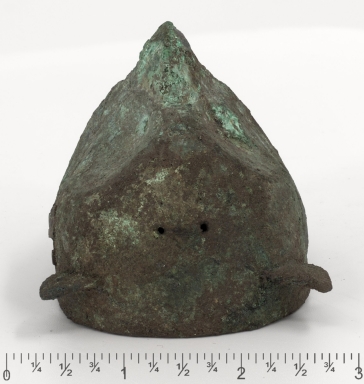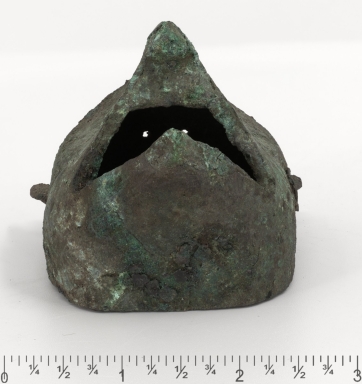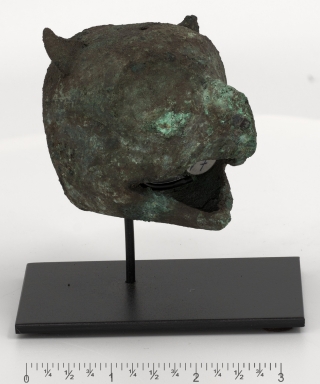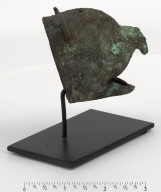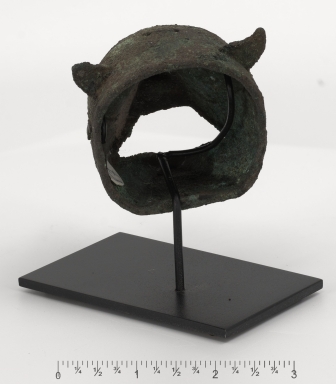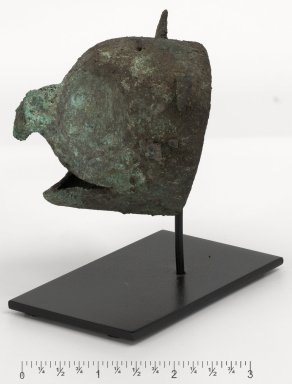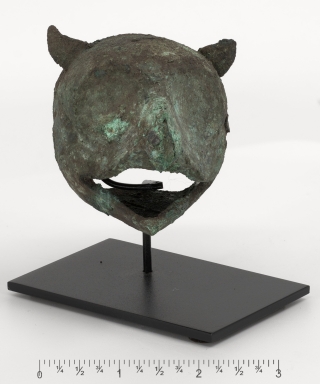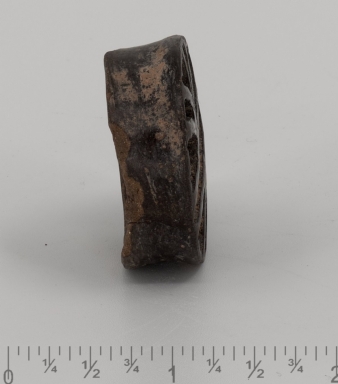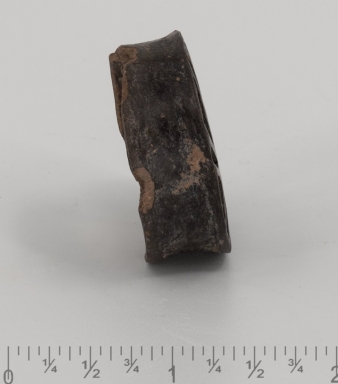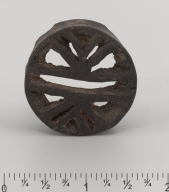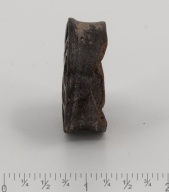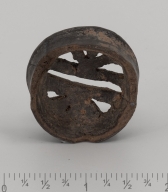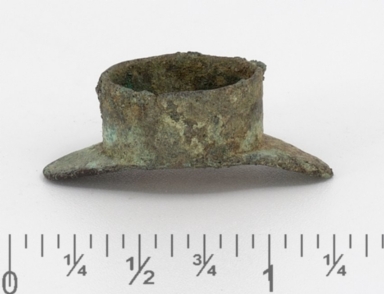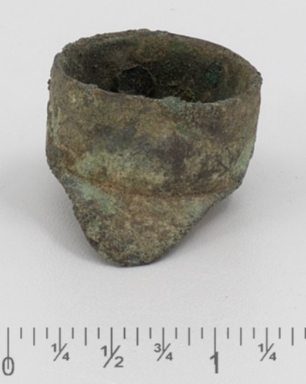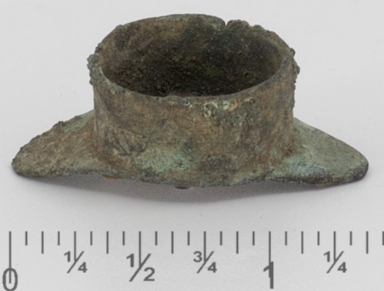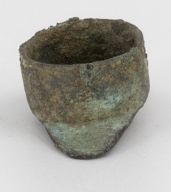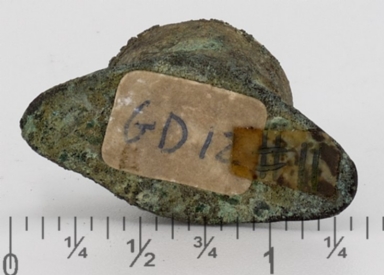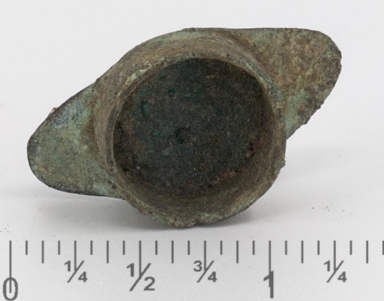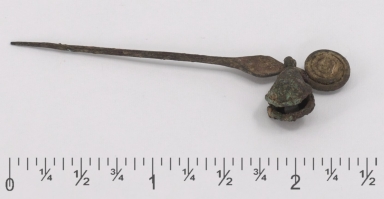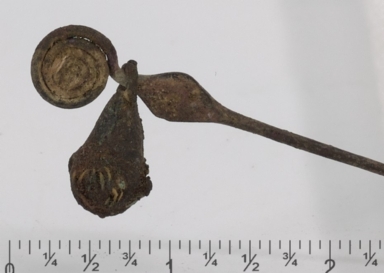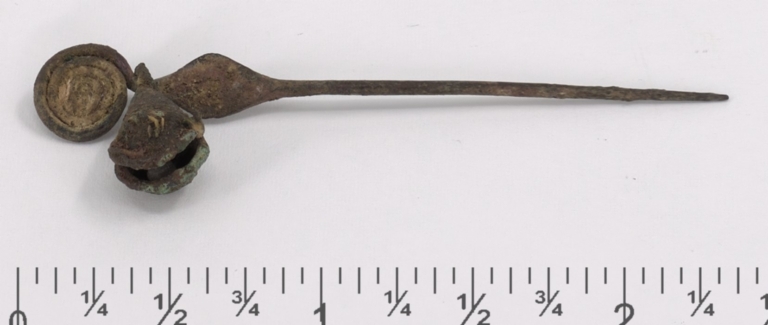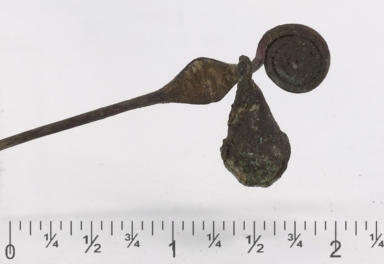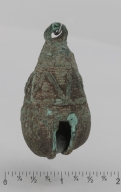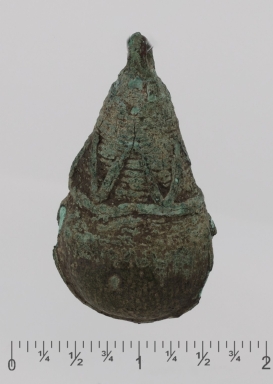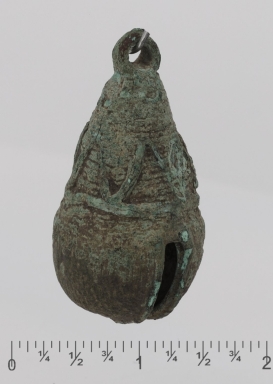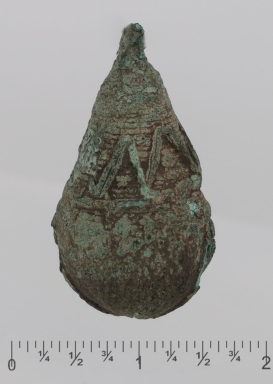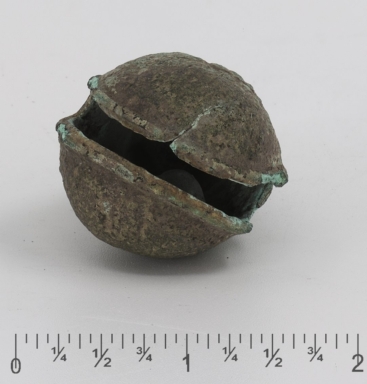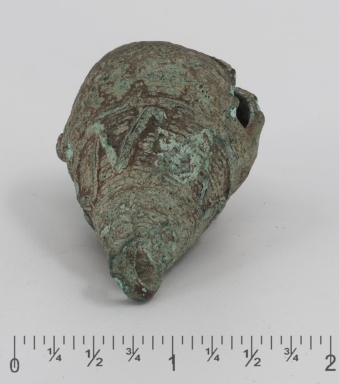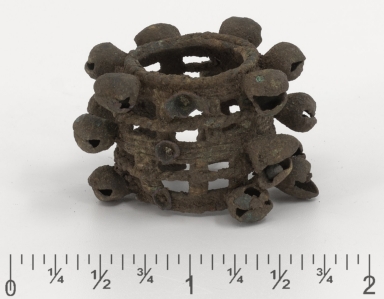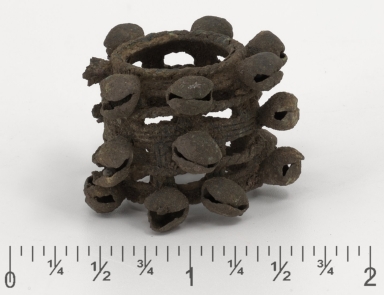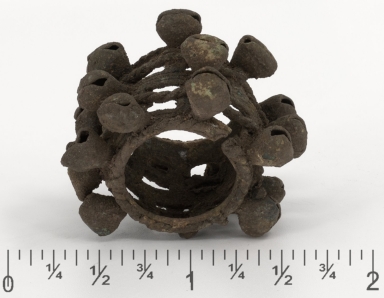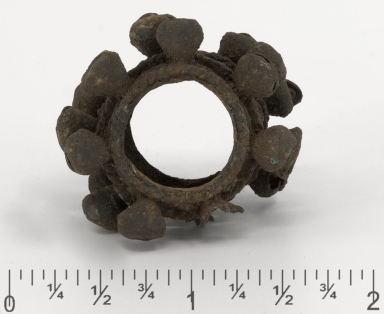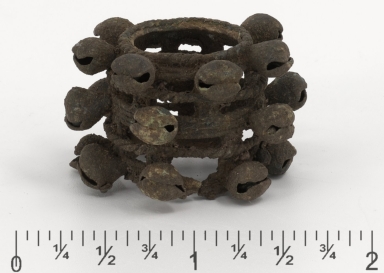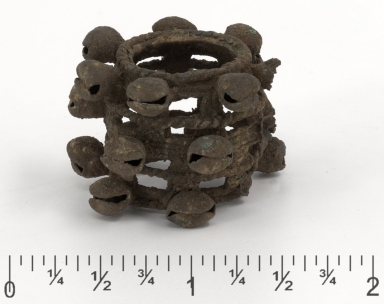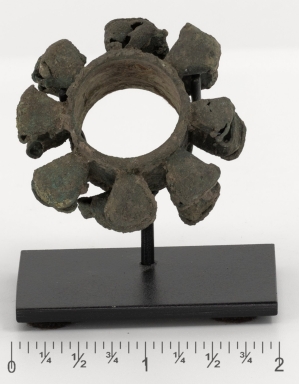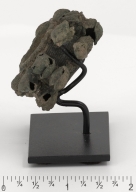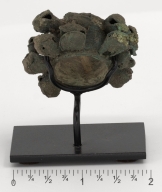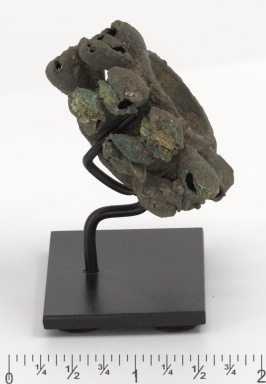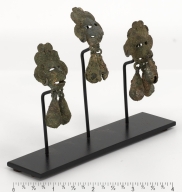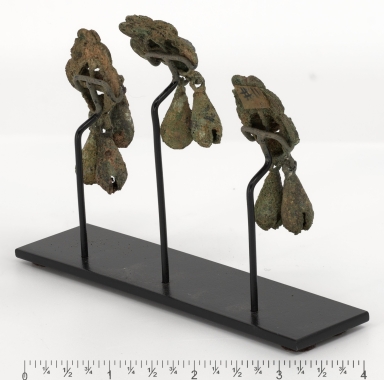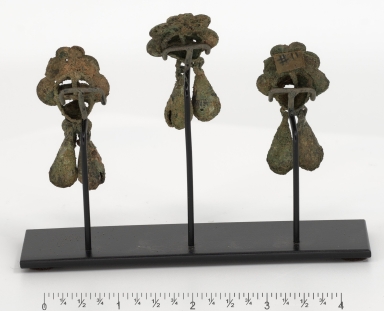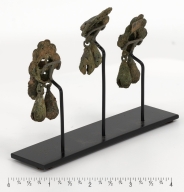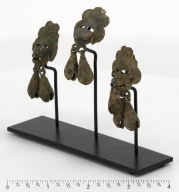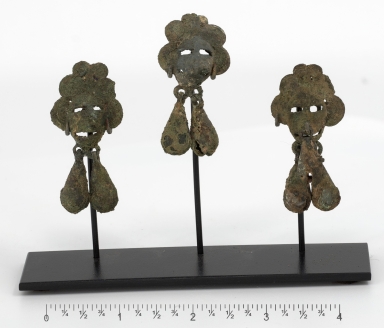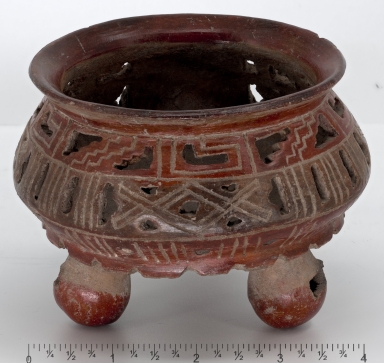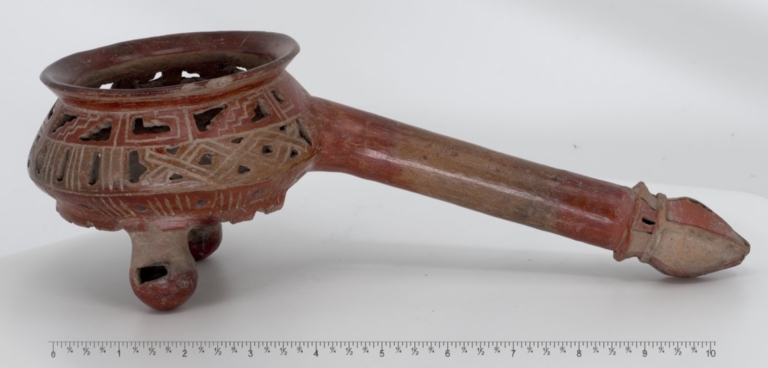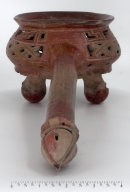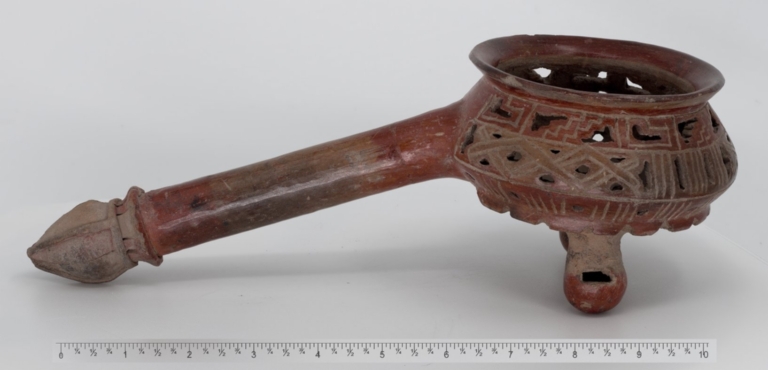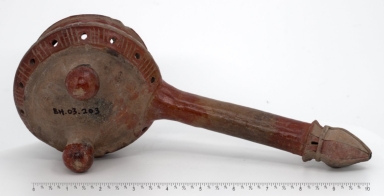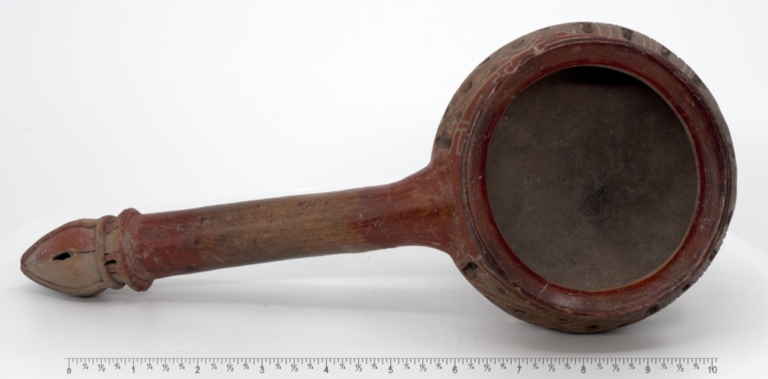|
Title
Owl Maskette
Description
This hollow, open-back copper maskette was cast using the lost-wax technique. The owl maskette was formed first in bees wax. The bees wax maskette was embedded in a super fine material such as clay. The clay and beeswax maskette was slowly heated melting out the bees wax and hardening the clay matrix. Molten metal was poured into the empty maskette are and cooled.
Subject
[Masks--Mexico, Aztec art--Mexico, Mixtec art--Antiquities, Purépecha art--Mexico, Indigenous peoples--Antiquities]
Date
between 900 and 1200
Title
Owl Maskette
Description
This hollow, open-back copper maskette was cast using the lost-wax technique. The owl maskette was formed first in bees wax. The bees wax maskette was embedded in a super fine material such as clay. The clay and beeswax maskette was slowly heated melting out the bees wax and hardening the clay matrix. Molten metal was poured into the empty maskette are and cooled.
Subject
[Masks--Mexico, Aztec art--Mexico, Mixtec art--Antiquities, Purépecha art--Mexico, Indigenous peoples--Antiquities]
Date
between 900 and 1200
Title
Owl Maskette
Description
This hollow, open-back copper maskette was cast using the lost-wax technique. The owl maskette was formed first in bees wax. The bees wax maskette was embedded in a super fine material such as clay. The clay and beeswax maskette was slowly heated melting out the bees wax and hardening the clay matrix. Molten metal was poured into the empty maskette are and cooled.
Subject
[Masks--Mexico, Aztec art--Mexico, Mixtec art--Antiquities, Purépecha art--Mexico, Indigenous peoples--Antiquities]
Date
between 900 and 1200
Title
Owl Maskette
Description
This hollow, open-back copper maskette was cast using the lost-wax technique. The owl maskette was formed first in bees wax. The bees wax maskette was embedded in a super fine material such as clay. The clay and beeswax maskette was slowly heated melting out the bees wax and hardening the clay matrix. Molten metal was poured into the empty maskette are and cooled.
Subject
[Masks--Mexico, Aztec art--Mexico, Mixtec art--Antiquities, Purépecha art--Mexico, Indigenous peoples--Antiquities]
Date
between 900 and 1200
Title
Owl Maskette
Description
This hollow, open-back copper maskette was cast using the lost-wax technique. The owl maskette was formed first in bees wax. The bees wax maskette was embedded in a super fine material such as clay. The clay and beeswax maskette was slowly heated melting out the bees wax and hardening the clay matrix. Molten metal was poured into the empty maskette are and cooled.
Subject
[Masks--Mexico, Aztec art--Mexico, Mixtec art--Antiquities, Purépecha art--Mexico, Indigenous peoples--Antiquities]
Date
between 900 and 1200
Title
Owl Maskette
Description
This hollow, open-back copper maskette was cast using the lost-wax technique. The owl maskette was formed first in bees wax. The bees wax maskette was embedded in a super fine material such as clay. The clay and beeswax maskette was slowly heated melting out the bees wax and hardening the clay matrix. Molten metal was poured into the empty maskette are and cooled.
Subject
[Masks--Mexico, Aztec art--Mexico, Mixtec art--Antiquities, Purépecha art--Mexico, Indigenous peoples--Antiquities]
Date
between 900 and 1200
Title
Owl Maskette
Description
This hollow, open-back copper maskette was cast using the lost-wax technique. The owl maskette was formed first in bees wax. The bees wax maskette was embedded in a super fine material such as clay. The clay and beeswax maskette was slowly heated melting out the bees wax and hardening the clay matrix. Molten metal was poured into the empty maskette are and cooled.
Subject
[Masks--Mexico, Aztec art--Mexico, Mixtec art--Antiquities, Purépecha art--Mexico, Indigenous peoples--Antiquities]
Date
between 900 and 1200
Title
Pierced blackware ear spool.
Description
Red-brown clay was probably pressed into a circular mold and allowed to become a leather hard disc. The disc has curved concave sides for wearing as an earspool. The disc was pierced with a bilateral radiating design. The pierced ear spool was fired in a reduced carbon friendly environment
Subject
[Ceramic jewelry--Mexico, Decoration and ornament--Mexico, Mixtec art--Mexico, Indigenous peoples--Antiquities]
Date
between 900 and 1200
Title
Pierced blackware ear spool.
Description
Red-brown clay was probably pressed into a circular mold and allowed to become a leather hard disc. The disc has curved concave sides for wearing as an earspool. The disc was pierced with a bilateral radiating design. The pierced ear spool was fired in a reduced carbon friendly environment
Subject
[Ceramic jewelry--Mexico, Decoration and ornament--Mexico, Mixtec art--Mexico, Indigenous peoples--Antiquities]
Date
between 900 and 1200
Title
Pierced blackware ear spool.
Description
Red-brown clay was probably pressed into a circular mold and allowed to become a leather hard disc. The disc has curved concave sides for wearing as an earspool. The disc was pierced with a bilateral radiating design. The pierced ear spool was fired in a reduced carbon friendly environment
Subject
[Ceramic jewelry--Mexico, Decoration and ornament--Mexico, Mixtec art--Mexico, Indigenous peoples--Antiquities]
Date
between 900 and 1200
Title
Pierced blackware ear spool.
Description
Red-brown clay was probably pressed into a circular mold and allowed to become a leather hard disc. The disc has curved concave sides for wearing as an earspool. The disc was pierced with a bilateral radiating design. The pierced ear spool was fired in a reduced carbon friendly environment
Subject
[Ceramic jewelry--Mexico, Decoration and ornament--Mexico, Mixtec art--Mexico, Indigenous peoples--Antiquities]
Date
between 900 and 1200
Title
Pierced blackware ear spool.
Description
Red-brown clay was probably pressed into a circular mold and allowed to become a leather hard disc. The disc has curved concave sides for wearing as an earspool. The disc was pierced with a bilateral radiating design. The pierced ear spool was fired in a reduced carbon friendly environment
Subject
[Ceramic jewelry--Mexico, Decoration and ornament--Mexico, Mixtec art--Mexico, Indigenous peoples--Antiquities]
Date
between 900 and 1200
Title
Copper labret.
Description
Labrets are ornamental plugs that fit into a slit/hole below the lower lip. An expanded flange holds it in place. Labrets are usually made out of stones like obsidian, red chert, green serpentine, or rock crystal. They were made of other materials such as clay and copper.
Subject
[Labrets, Jewelry--Mexico, Decoration and ornament--Mexico, Art--Mexico, Indigenous peoples--Antiquities]
Date
between 900 and 1200
Title
Copper labret.
Description
Labrets are ornamental plugs that fit into a slit/hole below the lower lip. An expanded flange holds it in place. Labrets are usually made out of stones like obsidian, red chert, green serpentine, or rock crystal. They were made of other materials such as clay and copper.
Subject
[Labrets, Jewelry--Mexico, Decoration and ornament--Mexico, Art--Mexico, Indigenous peoples--Antiquities]
Date
between 900 and 1200
Title
Copper labret.
Description
Labrets are ornamental plugs that fit into a slit/hole below the lower lip. An expanded flange holds it in place. Labrets are usually made out of stones like obsidian, red chert, green serpentine, or rock crystal. They were made of other materials such as clay and copper.
Subject
[Labrets, Jewelry--Mexico, Decoration and ornament--Mexico, Art--Mexico, Indigenous peoples--Antiquities]
Date
between 900 and 1200
Title
Copper labret.
Description
Labrets are ornamental plugs that fit into a slit/hole below the lower lip. An expanded flange holds it in place. Labrets are usually made out of stones like obsidian, red chert, green serpentine, or rock crystal. They were made of other materials such as clay and copper.
Subject
[Labrets, Jewelry--Mexico, Decoration and ornament--Mexico, Art--Mexico, Indigenous peoples--Antiquities]
Date
between 900 and 1200
Title
Copper labret.
Description
Labrets are ornamental plugs that fit into a slit/hole below the lower lip. An expanded flange holds it in place. Labrets are usually made out of stones like obsidian, red chert, green serpentine, or rock crystal. They were made of other materials such as clay and copper.
Subject
[Labrets, Jewelry--Mexico, Decoration and ornament--Mexico, Art--Mexico, Indigenous peoples--Antiquities]
Date
between 900 and 1200
Title
Copper labret.
Description
Labrets are ornamental plugs that fit into a slit/hole below the lower lip. An expanded flange holds it in place. Labrets are usually made out of stones like obsidian, red chert, green serpentine, or rock crystal. They were made of other materials such as clay and copper.
Subject
[Labrets, Jewelry--Mexico, Decoration and ornament--Mexico, Art--Mexico, Indigenous peoples--Antiquities]
Date
between 900 and 1200
Title
Small copper pin.
Description
Metallurgy in copper was popular in Mixtec times. The art of metalworking was introduced around AD 800 into West Mexico from Central or South America
Subject
[Pins and needles--Mexico, Art--Mexico, Indigenous Peoples--Antiquities]
Date
between 900 and 1200
Title
Small copper pin.
Description
Metallurgy in copper was popular in Mixtec times. The art of metalworking was introduced around AD 800 into West Mexico from Central or South America
Subject
[Pins and needles--Mexico, Art--Mexico, Indigenous Peoples--Antiquities]
Date
between 900 and 1200
Title
Small copper pin.
Description
Metallurgy in copper was popular in Mixtec times. The art of metalworking was introduced around AD 800 into West Mexico from Central or South America
Subject
[Pins and needles--Mexico, Art--Mexico, Indigenous Peoples--Antiquities]
Date
between 900 and 1200
Title
Small copper pin.
Description
Metallurgy in copper was popular in Mixtec times. The art of metalworking was introduced around AD 800 into West Mexico from Central or South America
Subject
[Pins and needles--Mexico, Art--Mexico, Indigenous Peoples--Antiquities]
Date
between 900 and 1200
Title
Tear drop bell.
Description
Bells, ax-shape knives, and other ornaments of copper became very prevalent during the Toltec period in Post-Classical Mexico. The Post-Classic Period is divided into Early, Middle, and Late or AD 900 to AD 1200 to AD 1400 to AD 1521.
Subject
[Bells--Mexico--Nayarit, Decoration and ornament--Mexico--Nayarit, Mixtec art--Mexico--Nayarit, Indigenous peoples--Antiquities]
Date
between 900 and 1200
Title
Tear drop bell.
Description
Bells, ax-shape knives, and other ornaments of copper became very prevalent during the Toltec period in Post-Classical Mexico. The Post-Classic Period is divided into Early, Middle, and Late or AD 900 to AD 1200 to AD 1400 to AD 1521.
Subject
[Bells--Mexico--Nayarit, Decoration and ornament--Mexico--Nayarit, Mixtec art--Mexico--Nayarit, Indigenous peoples--Antiquities]
Date
between 900 and 1200
Title
Tear drop bell.
Description
Bells, ax-shape knives, and other ornaments of copper became very prevalent during the Toltec period in Post-Classical Mexico. The Post-Classic Period is divided into Early, Middle, and Late or AD 900 to AD 1200 to AD 1400 to AD 1521.
Subject
[Bells--Mexico--Nayarit, Decoration and ornament--Mexico--Nayarit, Mixtec art--Mexico--Nayarit, Indigenous peoples--Antiquities]
Date
between 900 and 1200
Title
Tear drop bell.
Description
Bells, ax-shape knives, and other ornaments of copper became very prevalent during the Toltec period in Post-Classical Mexico. The Post-Classic Period is divided into Early, Middle, and Late or AD 900 to AD 1200 to AD 1400 to AD 1521.
Subject
[Bells--Mexico--Nayarit, Decoration and ornament--Mexico--Nayarit, Mixtec art--Mexico--Nayarit, Indigenous peoples--Antiquities]
Date
between 900 and 1200
Title
Tear drop bell.
Description
Bells, ax-shape knives, and other ornaments of copper became very prevalent during the Toltec period in Post-Classical Mexico. The Post-Classic Period is divided into Early, Middle, and Late or AD 900 to AD 1200 to AD 1400 to AD 1521.
Subject
[Bells--Mexico--Nayarit, Decoration and ornament--Mexico--Nayarit, Mixtec art--Mexico--Nayarit, Indigenous peoples--Antiquities]
Date
between 900 and 1200
Title
Tear drop bell.
Description
Bells, ax-shape knives, and other ornaments of copper became very prevalent during the Toltec period in Post-Classical Mexico. The Post-Classic Period is divided into Early, Middle, and Late or AD 900 to AD 1200 to AD 1400 to AD 1521.
Subject
[Bells--Mexico--Nayarit, Decoration and ornament--Mexico--Nayarit, Mixtec art--Mexico--Nayarit, Indigenous peoples--Antiquities]
Date
between 900 and 1200
Title
Copper shaft maces : 1.
Description
The Mixtec and the Aztec excelled in metalwork. Archaeologists believe metalsmithing moved from South America to Central America and into West Mexico. The Mixtec and the Tarascan favored copper, while the Aztec went for the gold. Needless to say, the conquistadores love gold and that is why there are few examples of this extrordinary craftsmanship.
Subject
[Copper jewelry--Mexico, Jewelry--Mexico, Mixtec art--Mexico, Indigenous peoples--Antiquities]
Date
between 900 and 1200
Title
Copper shaft maces : 1.
Description
The Mixtec and the Aztec excelled in metalwork. Archaeologists believe metalsmithing moved from South America to Central America and into West Mexico. The Mixtec and the Tarascan favored copper, while the Aztec went for the gold. Needless to say, the conquistadores love gold and that is why there are few examples of this extrordinary craftsmanship.
Subject
[Copper jewelry--Mexico, Jewelry--Mexico, Mixtec art--Mexico, Indigenous peoples--Antiquities]
Date
between 900 and 1200
Title
Copper shaft maces : 1.
Description
The Mixtec and the Aztec excelled in metalwork. Archaeologists believe metalsmithing moved from South America to Central America and into West Mexico. The Mixtec and the Tarascan favored copper, while the Aztec went for the gold. Needless to say, the conquistadores love gold and that is why there are few examples of this extrordinary craftsmanship.
Subject
[Copper jewelry--Mexico, Jewelry--Mexico, Mixtec art--Mexico, Indigenous peoples--Antiquities]
Date
between 900 and 1200
Title
Copper shaft maces : 1.
Description
The Mixtec and the Aztec excelled in metalwork. Archaeologists believe metalsmithing moved from South America to Central America and into West Mexico. The Mixtec and the Tarascan favored copper, while the Aztec went for the gold. Needless to say, the conquistadores love gold and that is why there are few examples of this extrordinary craftsmanship.
Subject
[Copper jewelry--Mexico, Jewelry--Mexico, Mixtec art--Mexico, Indigenous peoples--Antiquities]
Date
between 900 and 1200
Title
Copper shaft maces : 1.
Description
The Mixtec and the Aztec excelled in metalwork. Archaeologists believe metalsmithing moved from South America to Central America and into West Mexico. The Mixtec and the Tarascan favored copper, while the Aztec went for the gold. Needless to say, the conquistadores love gold and that is why there are few examples of this extrordinary craftsmanship.
Subject
[Copper jewelry--Mexico, Jewelry--Mexico, Mixtec art--Mexico, Indigenous peoples--Antiquities]
Date
between 900 and 1200
Title
Copper shaft maces : 1.
Description
The Mixtec and the Aztec excelled in metalwork. Archaeologists believe metalsmithing moved from South America to Central America and into West Mexico. The Mixtec and the Tarascan favored copper, while the Aztec went for the gold. Needless to say, the conquistadores love gold and that is why there are few examples of this extrordinary craftsmanship.
Subject
[Copper jewelry--Mexico, Jewelry--Mexico, Mixtec art--Mexico, Indigenous peoples--Antiquities]
Date
between 900 and 1200
Title
Copper shaft maces : 2.
Description
The Mixtec and the Aztec excelled in metalwork. Archaeologists believe metalsmithing moved from South America to Central America and into West Mexico. The Mixtec and the Tarascan favored copper, while the Aztec went for the gold. Needless to say, the conquistadores love gold and that is why there are few examples of this extraordinary craftsmanship.
Subject
[Copper jewelry--Mexico, Jewelry--Mexico, Mixtec art--Mexico, Indigenous peoples--Antiquities]
Date
between 900 and 1200
Title
Copper shaft maces : 2.
Description
The Mixtec and the Aztec excelled in metalwork. Archaeologists believe metalsmithing moved from South America to Central America and into West Mexico. The Mixtec and the Tarascan favored copper, while the Aztec went for the gold. Needless to say, the conquistadores love gold and that is why there are few examples of this extraordinary craftsmanship.
Subject
[Copper jewelry--Mexico, Jewelry--Mexico, Mixtec art--Mexico, Indigenous peoples--Antiquities]
Date
between 900 and 1200
Title
Copper shaft maces : 2.
Description
The Mixtec and the Aztec excelled in metalwork. Archaeologists believe metalsmithing moved from South America to Central America and into West Mexico. The Mixtec and the Tarascan favored copper, while the Aztec went for the gold. Needless to say, the conquistadores love gold and that is why there are few examples of this extraordinary craftsmanship.
Subject
[Copper jewelry--Mexico, Jewelry--Mexico, Mixtec art--Mexico, Indigenous peoples--Antiquities]
Date
between 900 and 1200
Title
Copper shaft maces : 2.
Description
The Mixtec and the Aztec excelled in metalwork. Archaeologists believe metalsmithing moved from South America to Central America and into West Mexico. The Mixtec and the Tarascan favored copper, while the Aztec went for the gold. Needless to say, the conquistadores love gold and that is why there are few examples of this extraordinary craftsmanship.
Subject
[Copper jewelry--Mexico, Jewelry--Mexico, Mixtec art--Mexico, Indigenous peoples--Antiquities]
Date
between 900 and 1200
Title
Copper human face pendant : 2.
Description
These hollow, open-back copper masks were cast usin the lost wax technique. There is a strap across the back so they could be secured to a headdress or a textile. The masks contained small bells which would tingle when moved.
Subject
[Pendants (Jewelry)--Mexico, Purépecha art--Antiquities, Mixtec art--Antiquities, Aztec art--Mexico, Indigenous Peoples--Antiquities]
Date
between 900 and 1200
Title
Copper human face pendant : 2.
Description
These hollow, open-back copper masks were cast usin the lost wax technique. There is a strap across the back so they could be secured to a headdress or a textile. The masks contained small bells which would tingle when moved.
Subject
[Pendants (Jewelry)--Mexico, Purépecha art--Antiquities, Mixtec art--Antiquities, Aztec art--Mexico, Indigenous Peoples--Antiquities]
Date
between 900 and 1200
Title
Copper human face pendant : 2.
Description
These hollow, open-back copper masks were cast usin the lost wax technique. There is a strap across the back so they could be secured to a headdress or a textile. The masks contained small bells which would tingle when moved.
Subject
[Pendants (Jewelry)--Mexico, Purépecha art--Antiquities, Mixtec art--Antiquities, Aztec art--Mexico, Indigenous Peoples--Antiquities]
Date
between 900 and 1200
Title
Copper human face pendant : 2.
Description
These hollow, open-back copper masks were cast usin the lost wax technique. There is a strap across the back so they could be secured to a headdress or a textile. The masks contained small bells which would tingle when moved.
Subject
[Pendants (Jewelry)--Mexico, Purépecha art--Antiquities, Mixtec art--Antiquities, Aztec art--Mexico, Indigenous Peoples--Antiquities]
Date
between 900 and 1200
Title
Copper human face pendant : 2.
Description
These hollow, open-back copper masks were cast usin the lost wax technique. There is a strap across the back so they could be secured to a headdress or a textile. The masks contained small bells which would tingle when moved.
Subject
[Pendants (Jewelry)--Mexico, Purépecha art--Antiquities, Mixtec art--Antiquities, Aztec art--Mexico, Indigenous Peoples--Antiquities]
Date
between 900 and 1200
Title
Copper human face pendant : 2.
Description
These hollow, open-back copper masks were cast usin the lost wax technique. There is a strap across the back so they could be secured to a headdress or a textile. The masks contained small bells which would tingle when moved.
Subject
[Pendants (Jewelry)--Mexico, Purépecha art--Antiquities, Mixtec art--Antiquities, Aztec art--Mexico, Indigenous Peoples--Antiquities]
Date
between 900 and 1200
Title
Mixtec ceramic censer : openwork design.
Description
The open design of this censer lightens the censer and allows the incense to burn better. The design combines a step motif as well as the woven mat motif. The two feet contain pellets to create a rattler noise.
Subject
[Pottery--Mexico, Ceramic censers--Mexico, Ceramic sculpture--Mexico, Indigenous peoples--Antiquities, Mixtec pottery--Mexico, Mixtec art--Mexico]
Date
between 900 and 1200
Title
Mixtec ceramic censer : openwork design.
Description
The open design of this censer lightens the censer and allows the incense to burn better. The design combines a step motif as well as the woven mat motif. The two feet contain pellets to create a rattler noise.
Subject
[Pottery--Mexico, Ceramic censers--Mexico, Ceramic sculpture--Mexico, Indigenous peoples--Antiquities, Mixtec pottery--Mexico, Mixtec art--Mexico]
Date
between 900 and 1200
Title
Mixtec ceramic censer : openwork design.
Description
The open design of this censer lightens the censer and allows the incense to burn better. The design combines a step motif as well as the woven mat motif. The two feet contain pellets to create a rattler noise.
Subject
[Pottery--Mexico, Ceramic censers--Mexico, Ceramic sculpture--Mexico, Indigenous peoples--Antiquities, Mixtec pottery--Mexico, Mixtec art--Mexico]
Date
between 900 and 1200
Title
Mixtec ceramic censer : openwork design.
Description
The open design of this censer lightens the censer and allows the incense to burn better. The design combines a step motif as well as the woven mat motif. The two feet contain pellets to create a rattler noise.
Subject
[Pottery--Mexico, Ceramic censers--Mexico, Ceramic sculpture--Mexico, Indigenous peoples--Antiquities, Mixtec pottery--Mexico, Mixtec art--Mexico]
Date
between 900 and 1200
Title
Mixtec ceramic censer : openwork design.
Description
The open design of this censer lightens the censer and allows the incense to burn better. The design combines a step motif as well as the woven mat motif. The two feet contain pellets to create a rattler noise.
Subject
[Pottery--Mexico, Ceramic censers--Mexico, Ceramic sculpture--Mexico, Indigenous peoples--Antiquities, Mixtec pottery--Mexico, Mixtec art--Mexico]
Date
between 900 and 1200
Title
Mixtec ceramic censer : openwork design.
Description
The open design of this censer lightens the censer and allows the incense to burn better. The design combines a step motif as well as the woven mat motif. The two feet contain pellets to create a rattler noise.
Subject
[Pottery--Mexico, Ceramic censers--Mexico, Ceramic sculpture--Mexico, Indigenous peoples--Antiquities, Mixtec pottery--Mexico, Mixtec art--Mexico]
Date
between 900 and 1200
|
